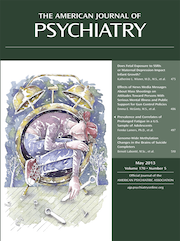Up-Regulation of NOTCH4 Gene Expression in Bipolar Disorder: Future Studies
To the Editor: In the December 2012 issue, Dieset et al. (1) reported significant up-regulation of NOTCH4 gene expression in whole blood in patients with bipolar disorder relative to healthy comparison subjects, and they identified several single-nucleotide polymorphisms (SNPs) that were significantly associated with NOTCH4 expression. This is a nice piece of research, and their findings have encouraged future research on the molecular mechanisms of NOTCH4 in bipolar disorder. However, several lines of their study data await further validation.
First, we are curious about whether the altered NOTCH4 expression that was observed in patients was caused by changes in the genetic background in bipolar disorder (related to the pathogenesis of the illness) or was just an outcome of the patients' physiological conditions. This is an important issue, but was inconclusive in the article, although the authors conducted the analyses adjusting for a range of confounders. A plausible solution to this problem is the use of an intermediate group: the healthy siblings of patients. These populations shared numerous genetic risk factors with the clinical patients but did not have any psychiatric illnesses. If the NOTCH4 expression was also elevated in the healthy siblings of bipolar patients relative to healthy comparison subjects, we could conclude that up-regulation of NOTCH4 expression may be related to the genetic mechanism in bipolar disorder and is likely involved in the pathophysiology of bipolar illness. However, because such data were absent in the Dieset et al. study, we are cautious about drawing any conclusions before further investigations.
Another issue we are concerned with is the analyses of SNPs in or around NOTCH4 and their associations with gene expression. Dieset et al. observed significant effects of the SNPs on NOTCH4 expression only in healthy individuals but not in bipolar patients, although the effect went in the same direction. Are these significantly associated SNPs authentic genetic risk factors for bipolar disorder? We examined their associations with bipolar disorder in the case-control samples of European ancestries published by the Psychiatric GWAS Consortium (2), which are the largest samples so far. However, none of these SNPs were significant (Table 1), suggesting that they are not risk variants for bipolar disorder even if they show strong associations with NOTCH4 expression in healthy individuals. On the other hand, if the increased NOTCH4 expression in patients was related to genetic mechanisms in bipolar disorder, the gene may harbor unidentified SNPs that are significantly associated with up-regulated NOTCH4 expression in patients. We think these SNPs may be the authentic risk genetic variants for bipolar disorder, and we call for future studies.
| Analysis | ||||||
|---|---|---|---|---|---|---|
| SNP | Position | Allele | Frequency | p | Odds Ratio | SE |
| rs510321 | 32302370 | A | 0.1885 | 0.077 | 1.055 | 0.030 |
| rs389703 | 32307217 | C | 0.8115 | 0.083 | 0.954 | 0.027 |
| rs365053 | 32303966 | G | 0.1967 | 0.066 | 1.052 | 0.028 |
| rs404890 | 32306845 | A | 0.2951 | 0.953 | 0.999 | 0.024 |
| rs3134926 | 32308125 | C | 0.7869 | 0.050 | 0.950 | 0.026 |
| rs415929 | 32297010 | C | 0.2869 | 0.750 | 0.992 | 0.026 |
| rs9267873 | 32307330 | C | 0.5738 | 0.196 | 0.969 | 0.025 |
1 : Up-regulation of NOTCH4 gene expression in bipolar disorder. Am J Psychiatry 2012; 169:1292–1300Link, Google Scholar
2



